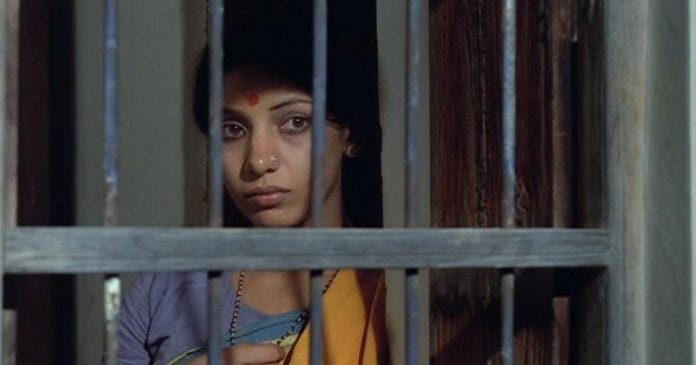The idyllic opening scene of Shyam Benegal’s Nishant belies the brutal realism of the national award-winning film. A priest walks to the temple in a serene village filled with birdsong. But the false serenity is shattered when he enters the place of worship, finding that it had been ransacked. What follows is a story of oppression and feudalism that shatters any Gandhian notion that India’s villages are oases of peace and simplicity.
Four zamindar brothers led by the jagirdar Anna (Amrish Puri) terrorise the village. Lands are seized, people looted and women raped. The jagirdar and his brothers are beyond the reach of the law as they grab land, rape women, and drink themselves to oblivion. The police have no power, and the villagers have accepted the poverty and oppression of their lives. It’s only after the schoolmaster’s wife, Sushila (Shabana Azmi) is kidnapped from her home and raped by two of the middle brothers that the village finally speaks up. It’s slow to brew but quick to froth and foam. And when the uprising does finally happen, it is as violent as the French Revolution. The villagers roar for blood and vengeance: Kill them! Kill them!
After tackling issues like caste and patriarchy in Ankur (1974), in Nishant, Benegal focused on the sexual exploitation of women in the 1940s and 50s in rural Telangana.
Shot in the soft hues of autumn, the 1975 film is disturbing and unsettling. Yet, it stays with you long after you finish watching it.
Though it is set in 1945, it could easily be a story of 2024. Such is the power of Vijay Tendulkar’s story and Benegal’s cinema. A star cast does not let the script down. Girish Karnad (the schoolmaster) plays the devoted but ineffectual husband to Sushila. Naseeruddin Shah is brilliant as the conflicted but straight-laced youngest brother of the jagirdar, Vishwam. And Smita Patil, who plays Rukmini, Vishwam’s young wife, adds a poignant note to the film when she offers comfort and solace to Sushila.
The bonds of sisterhood
While the story centres around the zamindar brothers, the most touching moments in the film are the scenes with Rukmini and Sushila in the same frame.
The friendship between Sushila and Rukmini adds another layer of depth to the movie. Though powerless, together they challenge the order of their rural world.
Despite the pervasive fear instilled by the zamindar brothers, even within their own household, Rukmini bravely speaks her mind. In one scene, she confronts Vishwam, admonishing him for his brothers’ ruthless behavior. “You are all butchers. Does this demonstrate your masculinity? God will never forgive you,” she declares.
But Rukmini’s initial kindness to Sushila starts to wane when she realises that her husband is obsessed with her. In fact, it was because of Vishwam’s attraction that his two older brothers (Mohan Agashe and Anant Nag) decided to kidnap Sushila from her home.
Both Azmi and Patil, with their brilliant performances, are the pillars of Nishant’s success. The women find themselves in a subconscious harmony with each other.
Shah’s acting brings depth and authenticity to the character of Vishwam—the perfect foil to his older, more debauched brothers.
Nishant marked Shah’s debut as an actor. But, according to the actor, he couldn’t reap the benefits. In an interview with Film Companion, he spoke about his struggle to find work even as most of the lead actors became stars after the film’s release.
“After Nishant was released, everyone got work except me. I later figured out that the reason was a backhanded compliment that people didn’t know that I was an actor. They thought I was some local, whom Shyam had picked up from Hyderabad. It was a huge compliment actually. But, at that time, it confused me,” he said.
His performance, a blend of restrained emotion and subtle intensity, conveyed the inner turmoil and ethical struggles of his character.
Problematic but compelling
Benegal’s film is violent and brutal, an unflinching gaze on everything that can go wrong in a society where poverty and illiteracy are rampant and landlords hold all the power.
Though the film may not be an easy watch, it is definitely a necessary one. It won the 1977 National Film Award for Best Feature Film in Hindi and was also selected to compete for the Palme d’Or at the 1976 Cannes Film Festival.
Nishant means night’s end in English. As the villagers, after killing Rukmini in their frenzy, surround Sushila and Vishwam, it bodes the beginning of a bloody dawn.






